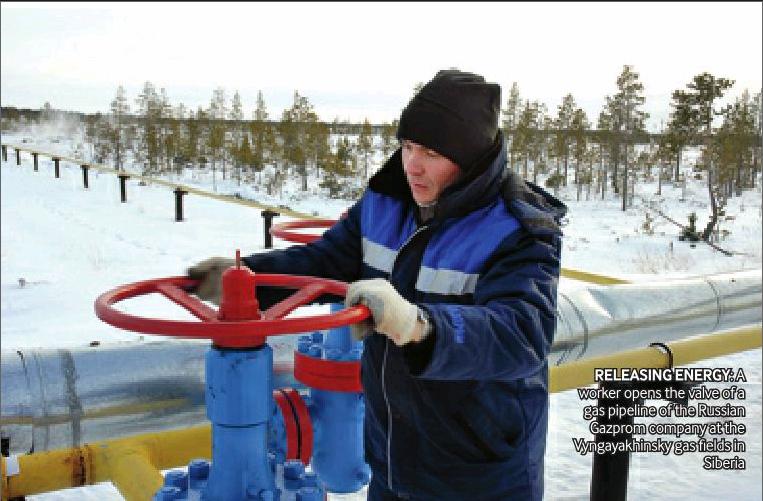A Gas Bond
2014-06-05ByDingYing
By+Ding+Ying

The marathon session of China-Russia nat- ural gas negotiations is expected to make a final sprint to the finish line. Energy experts from both sides revealed that a contract to bring Russian gas to China would be signed during Russian President vladimir Putins visit to Beijing on May 20-21. The energy arrangement will act as a new bond linking the two nations closer together.
A price beyond expectation
As Putins China tour approached in May, both sides had high expectations for the energy deal. But industry experts predicted that the price of natural gas from Russia might reach $400 per 1,000 cubic meters, a figure far exceeding Chinese enterprises hopes.
Xia yishan, Chairman of the China Center for Energy Strategy Studies and senior research fellow of China Institute of International Studies(CIIS), noted that negotiations over natural gas pipelines between China and Russia have lasted more than two decades. “Now both sides are very optimistic about the deal,” he said.
Alexy Belogoriev, Deputy Director General of the Institute of Energy Strategy in Russia, predicted that once the deal is inked, Russia will transport 30 billion cubic meters of gas via the western line and 38 billion cubic meters via the eastern line to China starting in 2018. “The current target is not a big volume. Russia annually sells 160 billion cubic meters of natural gas to Europe, but its future gas supply to China is expected to total about one third of Russias total gas trade overseas,” said Belogoriev.
Currently, there are two natural gas pipelines leading to China that are under construction. The eastern line starts from Russias Eastern Siberia to Chinas northeast. And the western line will run 2,800 km from Western Siberia to Chinas Xinjiang Uygur Autonomous Region.
Now that the Chinese and Russian governments have agreed to transport Russian gas to China, the only question remaining is at what price the gas will be sold.
According to Sun yongxiang, a researcher with the Development and Research Institute of the State Council, Russia may sell its gas supply to China at a price of $400 per 1,000 cubic meters.“The stated price is more than Chinese energy enterprises can agree to,” said Sun. “And that is why they are hesitant to sign on.”
This price is significantly higher than Chinese enterprises expectations. In June 2013, Chinese negotiators suggested a price of $235 per 1,000 cubic meters, but this was swiftly rejected by the Russians. In 2013, China purchased gas from Central Asian for about $165 to $195 per 1,000 cubic meters, but the annual import volume was less than 40 billion cubic meters.endprint
In Russia, gas costs about $108 per 1,000 cubic meters. The same amount is sold to Europe at a price of $380. In 2009, Ukraine signed a contract with Russia, agreeing to buy Russian gas for $400 per 1,000 cubic meters. Following the Ukrainian crisis, Russia hiked the prices to the country up to $485.
Sun predicted that despite the high price offered by the Russians, a deal still could be reached. “It is true that building pipelines through Siberia is more difficult and comes with higher construction and transportation costs,” he said. In return, China may offer favorable tax breaks for Chinese enterprises buying Russian natural gas and thereby ensure long-term energy security.
Strategic outlook
After over 20 years of negotiations, the ChinaRussia gas deal has become a matter not just of business, but of diplomatic importance between the two neighboring giants.
Xia stressed that China has been diversifying its sources of energy imports with the aim of boosting energy security, with Russia playing a key role. Chinas energy imports strategic layout extends north to Russia, west to Central Asia, and includes important shipping routes from other sources. The gas deal with Russia will greatly cut down on Chinas energy reliance on the Middle East, added Xia.
Due to its high-speed economic growth, Chinas demand for energy has been on the rise in recent decades. In 2013, Chinas oil demand increased 8 percent, while its thirst for natural gas grew over 26 percent, said Xia.
According to a report of the CNPC Economics and Technology Research Institute, Chinas crude oil and natural gas external dependence had reached 58.1 percent and 31.6 percent respectively in 2013. China has now become the third biggest natural gas consumer in the world, with a consumption of 167.8 billion cubic meters in 2013—a 13.9-percent year-onyear increase. Last year, China imported 53 billion cubic meters of natural gas. The report predicted that Chinas natural gas consumption will see an 11-percent growth in 2014, reaching 186 billion cubic meters.
Xia explained, “Chinas plan to address air pollution, especially smog, within the next 10 years, will demand a greater gas supply to replace current coal consumption.” In accordance with Chinas mid-term development plan, it will import at least 80 billion cubic meters of natural gas from Russia and Central Asia.
Russian experts claimed that the deal highlights the enhanced state of bilateral relations.endprint
Evgeniy Konygin, Chairman of SubCommittee for Energy Efficiency and Renewable Energy of Russian Union of Industrialists and Entrepreneurs, pointed out that the two sides are currently very clear about current world political and economic conditions, and that the two can cooperate on new energy projects, an area where China has many technological advantages.
Energy cooperation between China and Russia is not a response to Europes steps to move away from reliance on Russian natural gas, said Sergey Pikin, Director of Energy Development Fund, adding that the bilateral cooperation of energy is a corollary. He stressed that the two countries had signed many contracts prior to the expected agreement.
A shared desire to increase their economic strength and advance the principle of reciprocity is at the root of current bilateral economic cooperation efforts, he said.
Pikin concluded that having been the most rapidly developing economy in the world for the past decade, Chinas energy demand has risen in tandem. “Russia, one of the major energy providers in the world and a neighbor of China, is a better choice for China due to the lower cost of energy logistics,” he said. Besides, Pikin explained, Russia has the capability of exploiting low-cost energy projects, compared with other sources—an added benefit for developing economies such as China.
“Its normal for a big developing country and a world major energy supplier to strengthen energy cooperation,” said Sun. “Such a deal will benefit both sides.”
Chinese and Russian experts suggested bilateral energy cooperation can be extended to a wider range of endeavors.
Konygin proposed strengthening cooperation of energy-related technologies. “China has made tremendous achievements on new and clean energy exploration, such as wind and solar power. Russia intends to increase its own new energy supply. There are bright prospects for them to promote related technological cooperation,” said Konygin.
Pikin suggested that the two sides should also strengthen cooperation of energy exploitation in the Arctic and continent shelf. He pointed out that the Arctic possesses over one third of the worlds energy reserves, and Russia has an oil field there already.
“China is a well-known processing giant. It has great advantages in producing energy exploitation facilities,” said Xia. “We can manufacture all kinds of exploitation facilities and drilling platforms—and our prices are 50 to 60 percent lower than European and U.S. products of equal quality.”endprint
